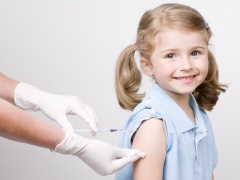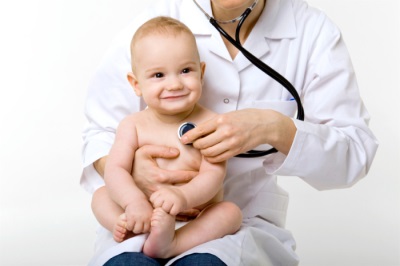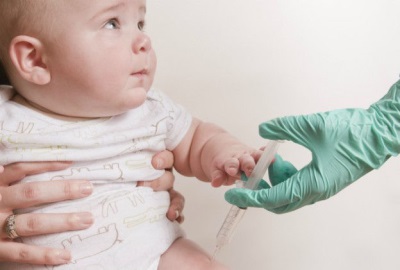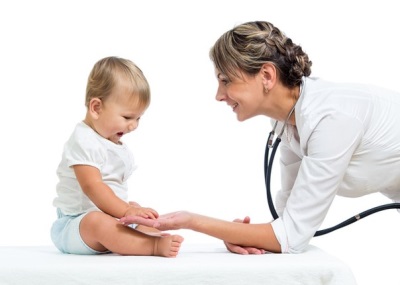Vaccination against hemophilic infection
The introduction of a vaccine against hemophilic bacilli is in the list of prophylactic vaccinations in Russia. And although this vaccination is carried out only under certain indications, parents should know in advance why they can offer this vaccine and how it affects the body of the baby.
What is dangerous disease?
Hemophilic infection can cause meningitis, pneumonia, otitis media, bronchitis and other inflammatory suppurative diseases, including damage to the joints and the heart, as well as sepsis. Purulent meningitis in children under six years of age in 30-50% is caused by a hemophilic infection. At the same time, such meningitis is severe and gives in 20–35% of cases irreversible changes in the nervous system and up to 20% of lethal cases. Even greater mortality is caused by septicemia caused by hemophilus bacilli - up to 40% of cases.
Epiglottitis, which also causes a hemophilus bacillus, is dangerous for young children with laryngeal edema that threatens the baby’s life. In addition, this infection is often complicated by cardiopulmonary insufficiency. We also note that the hemophilic infection is very difficult to treat - in 80% of cases the bacillus is resistant to antibiotics.
pros
- After revaccination at 1.5 years, the child acquires 100% protection against a hemophilic rod.
- The vaccine does not include live microorganisms, so it is impossible to get a hemophilic infection after vaccination.
- This vaccination has virtually no contraindications. It can only be entered in the acute period of any disease.
- Vaccination reduces the number of cases of acute respiratory infections when visiting a kindergarten.
- In order not to make several injections, combined vaccines have been developed that protect the little one from several infections at once.
Minuses
This vaccination can cause such unpleasant side reactions as swelling, tenderness and redness of the injection site (in 10% of children) and subfebrile fever (from 1% to 10% of cases). In 0.1-1% of children, the temperature may increase to febrile numbers, close to 38.5 °.
Possible complications
Complications that can be caused by vaccination include:
- Seal at the injection site;
- Allergic reactions;
- Lymphadenopania;
- Damage to the nervous system (if the child has encephalopathy).
How to prevent complications?
To make it easier for the child to undergo vaccination, it is important to inject drugs that affect the immunity only after a medical examination. It will establish whether the baby is healthy and there are no contraindications to this vaccination. Also, if there is a high risk of neurological complications, a neuropathologist should allow injection.
Should I vaccinate?
Hemophilic bacillus is transmitted from one person to another by airborne droplets. It represents the greatest danger for children under five years old. A child is able to contract such a wand from a person who is asymptomatic. As a result, the child will have complicated colds - a bacterial infection will join them.In many cases, this infection affects the lungs, the epiglottis, the meninges, the heart, and other organs. This is very dangerous for young children, so the benefits of vaccination are obvious.
Indications
This vaccination is prescribed:
- Children who are immunocompromised;
- Babies who are in the child's home;
- Infants with HIV and those born to mothers who have been diagnosed with HIV;
- Children who have oncohematological pathology;
- Babies with anatomical defects in which the risk of infection with hemophilic infection is increased.
It is also recommended to carry out this vaccination if:
- The baby receives the mixture and is not protected by antibodies from mother's milk;
- Baby was born prematurely;
- The baby is often sick;
- The child begins to attend the nursery in kindergarten.
Vaccination scheme
The calendar has the following dates for the introduction of a vaccine against hemophilic infection:
- The first injection - at three months of age.
- The second vaccination is four and a half months.
- The third vaccine is when the baby is half a year old.
- Revaccination - 1.5 years.
If for any reason the vaccine has been postponed for up to 6 months, then a child under the age of one year is given two vaccinations with an interval of 30 days, after which a booster vaccination is performed for 1.5 years. In the case when they want to vaccinate a child at the age of 1-5 years, the injection is given only once.
For vaccination against hemophilic infection use such vaccines:
- Act-HIB - a drug that protects the child from hemophilic sticks. The vaccine is well combined with other vaccinations, while they are administered in different parts of the body of the child.
- Pentaxim is a combined drug that allows you to simultaneously implant a baby not only from a hemophilus bacillus, but also from whooping cough, tetanus, diphtheria and polio. It consists of a hemophilic component represented by a separately packaged dried vaccine.
- Hiberix is a vaccine used to prevent diseases caused by hemophilus bacilli. You can combine this vaccine with any other, but enter in different parts of the body.
- Infanrix hexa is a combination vaccine that simultaneously protects against six infections (diphtheria, hemophilus bacillus, hepatitis B, whooping cough, polio and tetanus).
Opinion E. Komarovsky
A popular pediatrician advises you to be vaccinated against a hemophilus bacillus in order to protect your baby during the first years of life against the serious infectious diseases that it causes. He recalls that the danger from pneumonia, meningitis and other diseases caused by hemophilic infection is many times higher than the risk of a negative reaction to this vaccine.
At what age are vaccinated?
It is possible to begin vaccination against hemophilic infection from 2 months of age. Although the national calendar shows vaccination periods of 3, 4.5 and 6 months, it is possible to vaccinate at an older age.
Children from this infection are vaccinated before the age of 5, because after five years the immune system is already strong enough to withstand the hemophilus bacillus on its own.
Training
It is important that the child be examined by the doctor before the vaccination and determine if the crumb has contraindications. If there is a risk of allergy, before vaccination (two days) and after it (within two days), it is worth giving the baby antihistamine medicine.
How to make an injection?
The Act-HIB vaccine should be injected under the skin. Children younger than two years old are given an injection shot in the hip area, and at an older age - in the shoulder.
Pentaxim, Infanrix hexa and Hiberix are injected intramuscularly into the thigh into the quadriceps muscle. So the vaccine enters the muscle tissue, even in very young children. From the introduction of the buttock refused, because with it there is a risk of not getting into the muscle, as well as hurt the nerve or blood vessel.
What if there are side effects?
In most cases, vaccination does not give any side effects. In some children, the injection site may ache a little and turn red. It is also possible to raise the temperature to small numbers In this case, you can give the baby antipyretic medicine.
Reviews
Parents often consider the Hemophilus Bacterium vaccine unnecessary, because the infant is also vaccinated against other dangerous infections when the vaccine is administered. This raises concerns whether such a large number of vaccines will harm the crumbs' immunity. However, reviews of those who have already vaccinated their babies from a hemophilic infection mostly confirm the good tolerability of the vaccine.













